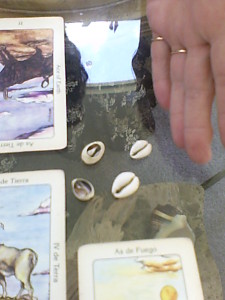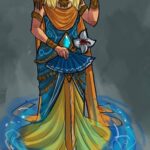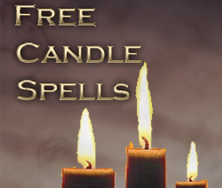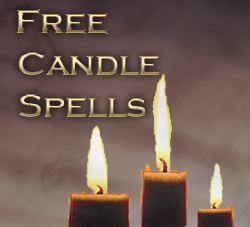Obi Divination Using Coconut or Cowrie Shells
Obi Divination History and Purpose in Divination
The concept of communication with the Spirits and Guardian Angels in the African Diaspora religions is an intricate part of the spiritual development of the practitioners, whether initiate or life long spiritual head of an ile (or “house of worship”). Obi divination is the methodology of obtaining an answer as guidance for movement in a situation or the outcome of current events. Questions posed before Obi must be in a way to elect an affirmative or negative (“Yes” or “No”) answer, with sometimes the answer revealed is a “maybe”.
Each answer will give clarity like a map, which way to turn and which option to take. Depending on the answer, various rituals as sprinkling water on the Obi or even taking the coconut out of the home when an extremely negative answer is given.
 The Yoruba based religions have many branches with variations in their ways of worship but the religions and belief systems that have crossed the Atlantic Ocean with the Diaspora to the New World have given blessing for the opportunity and the permission to use Obi as a method of divination in the New World. From the highest ranks of the religions, the Babalawo (High Priest), to the Babalorisha (male priests or Santeros), Iyalorishas (female priestesses or Santeras) and Aborisha (those not fully initiated into the religion), Obi is available for all the use. My Madrina has used four pennies in a quick method to divine whether I should go on a small trip with her or not. Luck has it that I should and I packed my bags for our “road trip”.
The Yoruba based religions have many branches with variations in their ways of worship but the religions and belief systems that have crossed the Atlantic Ocean with the Diaspora to the New World have given blessing for the opportunity and the permission to use Obi as a method of divination in the New World. From the highest ranks of the religions, the Babalawo (High Priest), to the Babalorisha (male priests or Santeros), Iyalorishas (female priestesses or Santeras) and Aborisha (those not fully initiated into the religion), Obi is available for all the use. My Madrina has used four pennies in a quick method to divine whether I should go on a small trip with her or not. Luck has it that I should and I packed my bags for our “road trip”.
The traditional method of divination with Obi instructs us to take a fresh coconut and split it into four equal parts by using a small mallet on the coconut while on a counter or tabletop. We are not to open the coconut by throwing the coconut against the floor, which is an insult to Obi. Obi is a basic tool of divination for any believer of orisha-based religions and in Spanish it is called “darle el coco” (dar el coco). When using Obi for divination, most of the time the orisha Ellegua (Elegua,Legba) will be consulted, as he sees what is down the “road” or “path” for you as Ellegua, guardian of the crossroads. Sometimes, the situation necessitates calling on any of other orishas; the nature based gods and Goddesses of the religions. In lieu of fresh coconut, sometimes cowrie shells are used for divination. I have also seen four coco shells with the cowries embedded in them.
Obi divination connects you to your higher power and consciousness. Obi gives the directives on what the Creator wants you to have, and to be, and the key to actions that will bring goodness to you and prosperous blessings. Obi reveals the direction that the Creator would like us to make, however, we are creatures of Free Will, and the Creator gives us that ability to make that choice to listen to the reading or to make different choices and plans. Depening on the configuration or patterns in which the shells fall, you might not get the answer you want, but what the answer that guarantees your success and prosperity because that answers is what the Creator wants for us.
Obi is used to ask “Yes” or “No” questions of the orishas, the ancestors of the family of the querent or their Ori (Soul). Obi is also used to determine whether an offering to the orishas to change or propiate the Spirit is needed or is an offering is sufficient and acceptable to the orisha. Obi CANNOT determine “who rules your head” or who is your ruling orisha. If you are being told this can be done with Obi, you are being falsely lead as only ordained leaders in Lukumi can determine this in a reading conducted right before making your Kariocha or being crowned into the religion. Beware of any false prophets who claim they can “see”, determine or “find out” who your ruling orisha is without the proper rituals being conducted.
Obi Shell Patterns that Occurs during Divination
The coconut or shells are considered as two “male” and two “female”. The person doing the divination will note and interpret the pattern on how they fall; whether they fall as “open” or “white coconut insides up” or “closed” or “dark coconut outside rind up”.
The five patterns are as follows:
Alafia
 (all four white sides of coconut showing or all four “open” sides of cowrie shells) means “Yes, with Blessings!”. This means that whatever the querent asked in the fall of the shells, it would happen most definitely and even with much more than they believed would occur. For this to be, a second toss with a “Etawa” (Etagua), or “Ejife” (Eyife) answer must be presented. If the second toss is “Okana Sode” or “Okekun”, then the final answer is “No”.
(all four white sides of coconut showing or all four “open” sides of cowrie shells) means “Yes, with Blessings!”. This means that whatever the querent asked in the fall of the shells, it would happen most definitely and even with much more than they believed would occur. For this to be, a second toss with a “Etawa” (Etagua), or “Ejife” (Eyife) answer must be presented. If the second toss is “Okana Sode” or “Okekun”, then the final answer is “No”.
Etawa
 (aka Etagua) (three white coconut sides and one dark rind side or three “open” shells and one “closed” shell) means “You will probably receive or achieve what you asked but you will have to work for it and there will be delays and obstacles to work through.”
(aka Etagua) (three white coconut sides and one dark rind side or three “open” shells and one “closed” shell) means “You will probably receive or achieve what you asked but you will have to work for it and there will be delays and obstacles to work through.”
Ejife/Eijife
 (aka Eyijife) (two white coconut sides, two dark rind sides or two “open” and two “closed” shells) means “Yes, definitely, and there is no need to ask any further”. When you get this answer, traditionally there is no need to ask any further on the subject, lest you irritate the orisha speaking to you.
(aka Eyijife) (two white coconut sides, two dark rind sides or two “open” and two “closed” shells) means “Yes, definitely, and there is no need to ask any further”. When you get this answer, traditionally there is no need to ask any further on the subject, lest you irritate the orisha speaking to you.
Okana
 (aka Okana Sode) (three dark rind coconut sides and one white or three “closed” shells and one “open” shell) “No.”
(aka Okana Sode) (three dark rind coconut sides and one white or three “closed” shells and one “open” shell) “No.”
Oyeku
 (aka Oyekun) (four dark rind coconut sides or four “closed” shells) “No!” A strong “NO!” or negative answer that indicates negativity and will need additional spiritual cleansing; hence a visit to a higher spiritual head (Babalawo) for works done for the querent to clear this negativity.This is a dire circumstance.
(aka Oyekun) (four dark rind coconut sides or four “closed” shells) “No!” A strong “NO!” or negative answer that indicates negativity and will need additional spiritual cleansing; hence a visit to a higher spiritual head (Babalawo) for works done for the querent to clear this negativity.This is a dire circumstance.
Click here to contact me.







